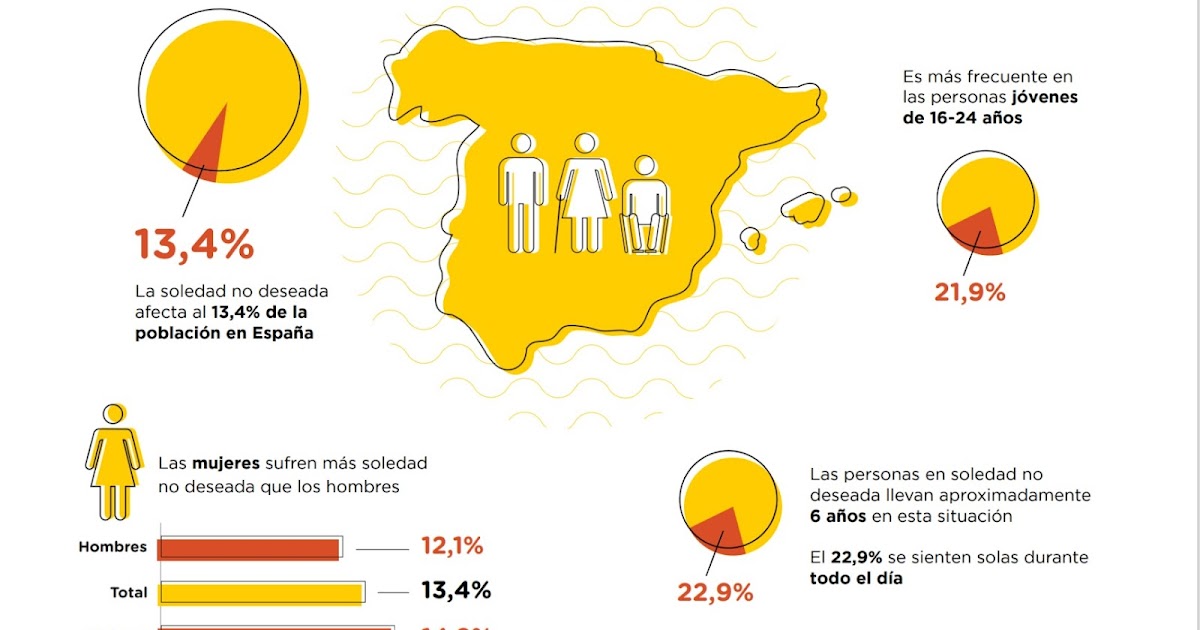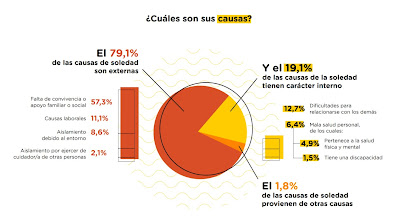
Loneliness can affect anyone at any time in their life. It has no gender, no age, it doesn’t even have to do with living alone. We can be surrounded by people and feel lonely. That’s why it’s important distinguish between being alone and feeling alone. Being alone implies a lack of company, but it does not have to be synonymous with negative feelings. Sometimes, it gives us a pleasant and even desirable feeling. Every day we are alone at some point, sometimes we even seek to be alone to think or rest. However, no one likes to feel alone. The feeling of loneliness is an unpleasant, uncomfortable and painful experience that can be experienced even when in company.
Source: The Cost of Unwanted Loneliness in Spain. State Observatory of Unwanted Loneliness
The feeling of loneliness is very personal, so different people in similar situations may or may not experience this feeling. However, there are factors that are closely related to the feeling of loneliness:
- Our desires and needs for relationships. Living alone by one’s own decision is not the same as living by an imposed situation. It is not bad to be alone, the bad thing is to be alone and not want it.
- The quality of our relationships. It is of little use to be surrounded by people if we cannot share with them our desires, opinions, concerns…
- Duration of loneliness. It is easier to manage the feeling of loneliness when we know that the situation that causes it is temporary.
The feeling of loneliness usually appears when the balance between the relationships we want and the ones we have is broken. Some situations that cause this break in balance are the following:
- Death of a loved one.
- Loss of friendly relationships
- Breakup of romantic relationships.
- Retirement or dismissal.
- Change of residence or institute.
- Health problems that isolate us.
- Architectural barriers that prevent or make it difficult for us to leave the house and socialize.
Although the feeling of loneliness is independent of age, as we age, the factors and situations that trigger this feeling are more likely to occur.
The feeling of loneliness can be harmful to both our mental and physical health, in addition to negatively affecting our quality of life. Loneliness has been linked to a higher incidence of heart problems, high blood pressure, alcoholism, depression, anxiety, etc…
Nevertheless, The feeling of loneliness can be prevented. It is important that we work to maintain and strengthen our social relationships, as well as to expand them. It is not about having many social relationships but it is important that they are of quality.
Below, we share some tips to prevent loneliness:
- Take care of your relationship with your social networks. Be interested in how your friends, acquaintances or family are doing.
- Expand your social connections. Get to know the associations, organizations and resources in your area, participate and sign up for a group activity.
- Take advantage of local spaces and businesses to connect with other people.
- Learn to manage your emotions and resolve conflicts.. Often the distance between people is due to a situation that has not been adequately resolved.
- Don’t forget to say thank you and, if necessary, apologize. It is a way for people to feel respected and valued.
- Be empathetic. When we talk about social relationships it is essential to be aware of our needs, but also of the needs of others.
- Avoid maintaining toxic relationships or those that cause you discomfort. Our social relationships have to be beneficial and healthy.
Some of the measures or actions that Public Administrations, Institutions and other entities can carry out to promote social relationships and contribute to the prevention of unwanted loneliness are:
- Promote friendly spaces in the environment. It is important to create and energize friendly spaces that promote social interaction in the community and prevent loneliness. An example of this would be he Live and Share Program (intergenerational shared housing program between seniors and university students in Huesca) and the program Age-Friendly Cities and Communities.
- Implement projects that enhance or favor communication and interaction with people who suffer from unwanted loneliness. For example, the project Reading Commands, Words that Heal of the Tram Foundation.
- Develop public policies to combat unwanted loneliness.
Sources and resources of interest:









Your point of view caught my eye and was very interesting. Thanks. I have a question for you.
Can you be more specific about the content of your article? After reading it, I still have some doubts. Hope you can help me. https://www.binance.com/pt-BR/join?ref=YY80CKRN
I don’t think the title of your article matches the content lol. Just kidding, mainly because I had some doubts after reading the article.